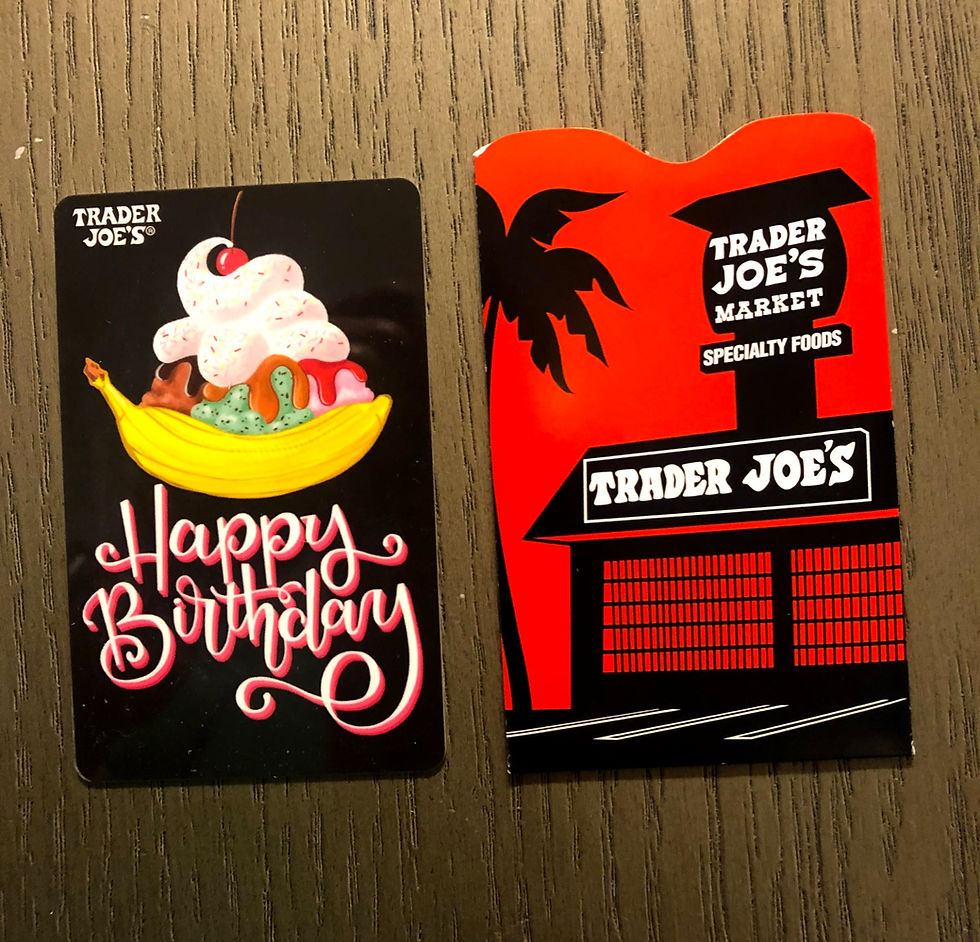
I got this gift card from Trader Joe’s for my birthday. There is not a Trader Joe’s very close to me, but there is one close to where I go to church. So, I sometimes go there on Sundays. Mostly, I buy fish there because I eat mostly fish. It has a good selection. You don’t often find barramundi or Dover sole in a regular grocery store. And, of course, the prices are reasonable. My sister Julie likes going to the Trader Joe’s closest to her in Charlotte, N.C. because it often has wine tastings. The story is that Trader Joe’s negotiated with the Charles Shaw winery in California and sold its wine for only $2 a bottle, nicknamed "Two Buck Chuck." It sells for $3/bottle outside of California and is pretty tasty. Trader Joe’s does have products that it sources from all over the world. And its private label products are often of high quality. The hot cocoa snowman bombs it had at Christmas were adorable and delicious. My niece’s children enjoyed watching the snowman melt in the hot chocolate. One Christmas I found a cookbook with recipes using only Trader Joe’s private label ingredients and gave it to my sister. Since she often bought food with the Trader Joe’s private label, it was helpful for her. I guess I think of Trader Joe’s as the Ikea of the food industry — low in price but high in quality. Let’s find out more about Trader Joe’s.
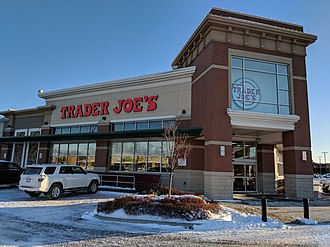
According to Wikipedia, Trader Joe's is an American chain of grocery stores headquartered in Monrovia, California. By 2015, it was a competitor in "fresh format" grocery stores in the United States. By November 2019, Trader Joe's had over 503 stores nationwide in 42 states and Washington, D.C.
The first Trader Joe's store was opened in 1967 by founder Joe Coulombe in Pasadena, California. It was owned by German entrepreneur Theo Albrecht from 1979 until his death in 2010, when ownership passed to his heirs. Albrecht's family also owns the German supermarket chain Aldi Nord which — according to Trader Joe's management — operates independently. Aldi Süd — owned by another branch of the Albrecht family — operates separately in the U.S. under the Aldi name and logo, but has no business relationship to Trader Joe's. The company has offices in Monrovia and Boston, Massachusetts.

History
Trader Joe's is named after its founder, Joe Coulombe. The company began in 1958 as a Greater Los Angeles area chain known as Pronto Market convenience stores. Coulombe felt the original Pronto Markets were too similar to 7-Eleven, and the competition would be too much.
Coulombe developed the idea of the Trader Joe's South Seas motif while on vacation in the Caribbean. The Tiki culture fad was fresh in the cultural memory, and he had noticed that Americans were traveling more and were acquiring tastes they had trouble satisfying in American supermarkets at the time. The Trader Joe's name was a spoof on Trader Vic's, the famous tiki-themed restaurant that had opened its first location in the Beverly Hilton in 1955. Trader Vic's in Beverly Hills was notoriously expensive to eat at, but Trader Joe's in Pasadena would provide an irreverent and less-expensive offering of food and drink.
The first store branded as "Trader Joe's" opened in 1967 in Pasadena, California; it remains in operation as of 2021. In the first few decades, some of the stores offered fresh meats provided by butchers who leased space in the stores, along with sandwiches and freshly cut cheese — all in-store.
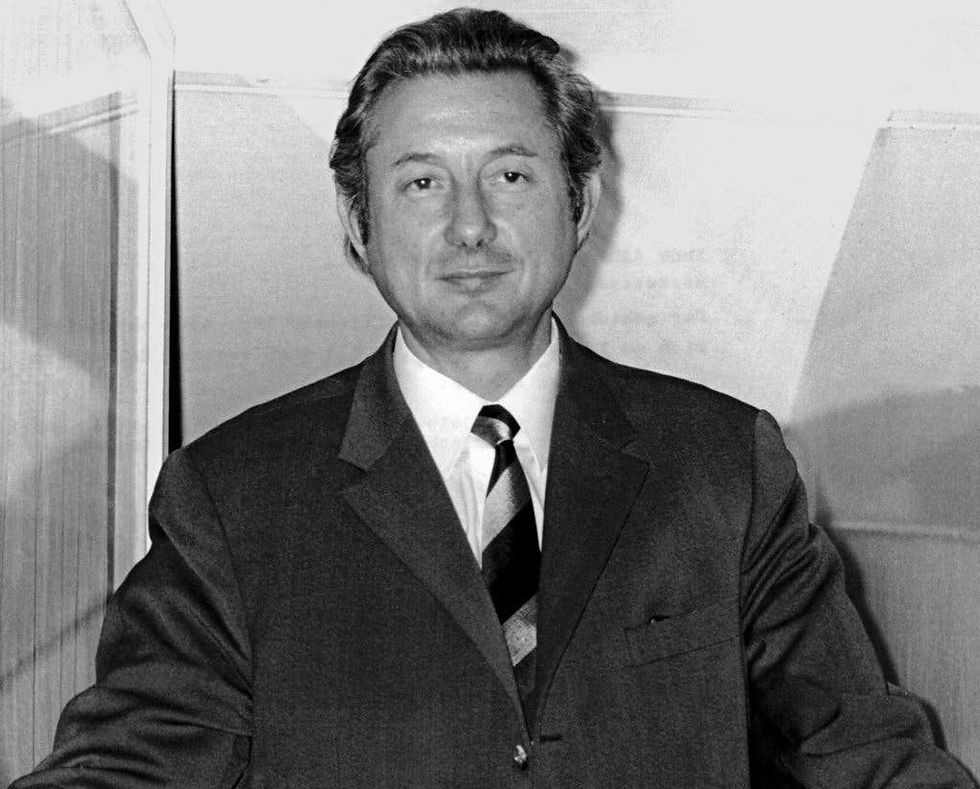
In 1979, Germany's Theo Albrecht — owner and CEO of Aldi Nord — bought the company as a personal investment for his family. Coulombe was succeeded as CEO by John Shields in 1987. Under his leadership the company expanded into Arizona in 1993 and into the Pacific Northwest two years later. In 1996, the company opened its first stores on the East Coast in Brookline and Cambridge, both just outside Boston. In 2001, Shields retired from his position and Dan Bane succeeded him as CEO.
In 2004, BusinessWeek reported that Trader Joe's quintupled its number of stores between 1990 and 2001, and increased its profits tenfold.
In February 2008, BusinessWeek reported that the company had the highest sales per square foot of any grocer in the United States. Two-and-a-half years later and in 2016, Fortune magazine estimated sales to be $1,750 in merchandise per square foot — more than double the sales generated by Whole Foods.
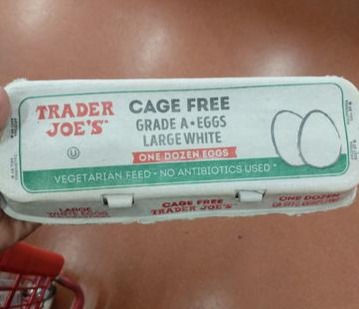
In February 2016, due to customer feedback, Trader Joe's announced its goal "to have all the eggs [it] sells in western states California, Oregon, Washington, Arizona, New Mexico and Colorado — come from cage-free suppliers by 2020, and all the eggs [it] sells nationally to come from cage-free suppliers by 2025."
Joe Coulombe, the namesake of the brand, died in 2020.
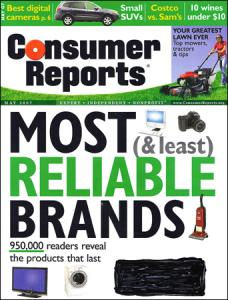
Awards and honors
In May 2009, Consumer Reports ranked Trader Joe's the second-best supermarket chain in the United States after Wegmans. In June 2009, MSN Money released its annual Customer Service Hall of Fame survey results, in which Trader Joe's ranked second in customer service. From 2008-2010, Ethisphere magazine listed Trader Joe's among its most ethical companies in the United States, but it did not make the list in 2011. In 2014, Consumer Reports again ranked Trader Joe's a top-scoring supermarket chain. The company ranked No. 23 among the 2019 Glassdoor best places to work in the US and No. 14 in 2020.
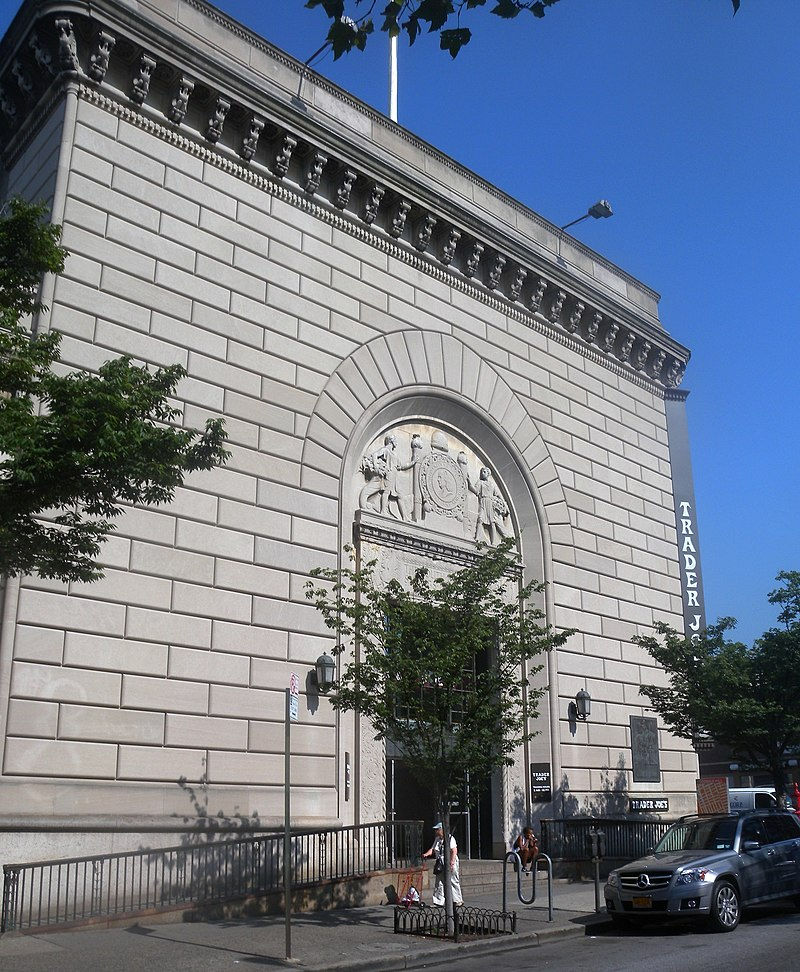
Locations
As of January 19, 2021, Trader Joe's had 530 stores in the United States with stores being added regularly. In 2017, Trader Joe's opened 14 new stores nationwide. Most locations averaged between 10,000 and 15,000 square feet. California has the largest number of stores with 183 open in the state.
Each location is designed to represent its respective area. Every store has its own staff members that create artwork to represent the surrounding neighborhood. Some store locations have their own "Find the Mascot," and children can obtain a prize when they tell a staff member where it is "hiding."
Trader Joe's is a tiki-nautical-themed establishment but locational stores may include props to blend into the local area; for example, a surf theme for a store near the beach. Along with their interior, stores supply products that are specialized to the people of that location.
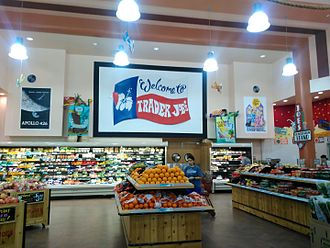
Products
While a typical grocery store may carry 50,000 items, Trader Joe's stocks about 4,000 items, 80% of which bear one of its own brand names. Trader Joe's describes itself as "your neighborhood grocery store." Products include gourmet foods, organic foods, vegetarian foods, unusual frozen foods, imported foods, domestic and imported wine and beer where local law permits and "alternative" food items, such as vegan and vegetarian options.
Many of the company's products are environmentally friendly. In October 2007, amid customer concerns, Trader Joe's began to phase out foods imported from China, and from February to April 2008, Trader Joe's phased out single-ingredient products from China because of customer concerns. Between 2012 and 2013, Trader Joe's moved from 15th on Greenpeace's CATO or Carting Away the Oceans scale to third by removing six unsustainable species of fish from its shelves and getting involved in efforts to protect the Bering Sea Canyons.
Trader Joe's discontinues individual products based on customer reactions more often than larger grocery chains to free up space for new items. Some products are exclusive to certain regions e.g., Midwest or East Coast of the United States, depending on availability and popularity.
Trader Joe's sells many items under its own private labels, at a significant discount to brand-name equivalents and requires its brand-name suppliers not to publicize this business relationship. Trader Joe's labels are sometimes named in accordance with the ethnicity of the food in question, such as "Trader Jose's" (Mexican food), "Baker Josef's" (flour and bagels), "Trader Giotto's" (Italian food), "Trader Joe-San's" (Japanese food), "Trader Ming's" (Asian food), "JosephsBrau" (beer) and "Trader Jacques" (French food and soaps). By selling almost all of its products under its own labels, Trader Joe's "skips the middle man" and buys directly from both local and international small-time vendors.

Trader Joe's is the exclusive retailer of Charles Shaw wine, popularly known as "Two Buck Chuck" because of its original $1.99 price tag in California, local prices vary. Of the wine selection at Trader Joe's, Coulombe has said, "We built Trader Joe's on wine first, then food. I tasted 100,000 wines, and most weren't wonderful. They were submitted to us by desperate vintners." Along with Charles Shaw, Trader Joe's is known for stocking a very large selection of California and New World wines.
Trader Joe's has said its private-label products contain no artificial flavors, no artificial preservatives, no colors derived from anything other than naturally available products, no genetically modified ingredients, no partially hydrogenated oils — adding trans fat and no MSG.
On May 1, 2018, Trader Joe's launched its first podcast, Inside Trader Joe's. This podcast has five seasons and 24 episodes and features crew members, store captains and executives. Listeners can learn about the way the retailer does business, where and how they discover new products, get answers to frequently asked questions and more.
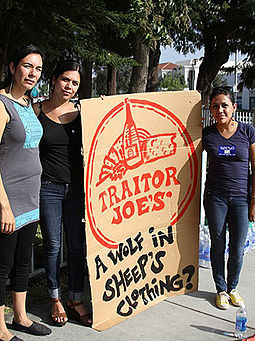
Criticism
Trader Joe's ranked poorly in a 2013 Greenpeace report on sustainable foods. According to an article titled "Trader Joe's Gets it Easy?":
The chain ranked low on Greenpeace's sustainable seafood report card. The packaging is excessive with even the produce sealed in plastic. The business model forces consumers to buy in quantities large enough to encourage waste. And most of Trader Joe's products are made on equipment shared with everything you might be allergic to (dairy, nuts) or philosophically opposed to eating (dairy, meat).
— Cameron Scott, San Francisco Chronicle, 2013
The retailer has been characterized as "notoriously secretive," and it has also been criticized for a lack of transparency by management about the sources of products such as organic milk. Trader Joe's scores the lowest on Green America's chocolate scorecard, as the retailer shares very little about addressing child labor or deforestation caused by the chocolate it sells.
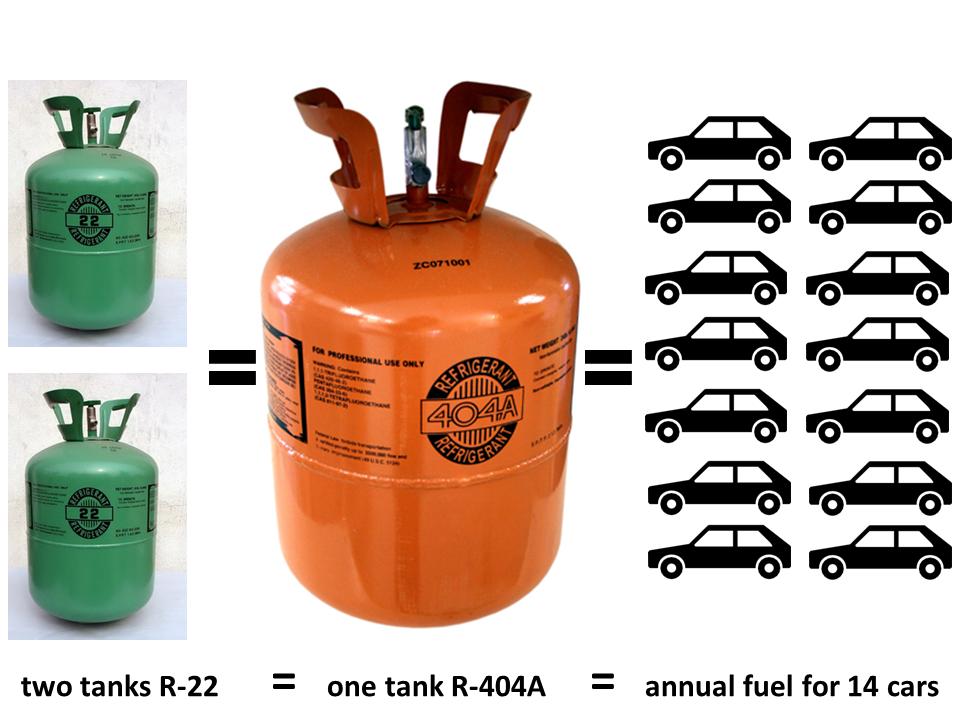
In a 2016 settlement with the Environmental Protection Agency and Department of Justice, Trader Joe's violated the Clean Air Act by emitting high global warming potential or GWP and ozone-depleting refrigerants. The company was tasked with reducing its emissions and creating a process to track and repair refrigerants, and was required to use refrigerants with an ultra-low GWP in 15 stores. Since then, the company has not shared its progress to reduce leak rates or publicly report its climate emissions.
More recently, Trader Joe's received the lowest score on the Environmental Investigation Agency's Climate-Friendly Supermarket Scorecard which assessed the company's actions to reduce its use and emission of high-GWP hydrofluorocarbons in its refrigeration equipment. Despite Trader Joe's 2016 settlement, it does not publicly disclose what steps it is taking to address the climate impact of its refrigeration.
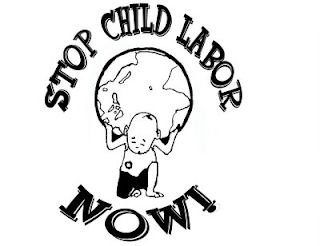
Trader Joe's inaction on issues pertaining to climate and labor led to the 2020 launch of "Don't Discount Our Future, Trader Joe's" by EIA and Green America. The campaign asks Trader Joe's to publicly report the climate impact of its operations and to end the use of child labor throughout its supply chain.
In September 2013, in response to the implementation of the Affordable Care Act or ACA, Trader Joe's stated that it would require part-time employees to work an average of 30 hours per week in order to qualify for medical insurance, with free coverage for basic dental and vision care still being available for all crew members who work an average of 15 hours or more per week. Part-time employees who were not qualifying for medical insurance would now be eligible for plans which were available under the ACA, but they would only be made available to those employees whose employers do not offer them an insurance plan. Those employees who were working full-time were unaffected.
In 2016, employees in New York City contacted the Retail, Wholesale and Department Store Union because "conditions deteriorated" at their store — the Trader Joe's on Manhattan's Upper West Side. One employee who was involved in the unionization effort was "repeatedly reprimanded because managers judged his smile and demeanor to be insufficiently 'genuine.'" He was fired in September of that year for what the managers described as an “overly negative attitude."
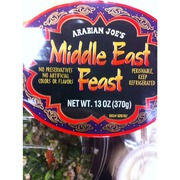
Controversial international food branding
In 1977, the company began introducing international-sounding variants of its brand for some of its private label ethnic food items, such as "Trader José," "Trader Joe-San" and "Trader Giotto" for Mexican, Japanese and Italian products. The company also referenced other cultures with branding like "Trader Ming's," "Arabian Joe's" and "Pilgrim Joe" for Chinese, Middle Eastern and Thanksgiving-themed American products. In July 2020, following the murder of George Floyd and the ensuing nationwide protests, an online petition signed by 5,300 people asked the company to rename these products, criticized their labeling as "racist" and accused the company of promoting "a narrative of exoticism that perpetuates harmful stereotypes."
The company reacted by stating that it was already in the process of reverting a number of international foods back to Trader Joe's branding e.g., "Arabian Joe's" and "Armenian Joe's" — stressing that this decision had already been made several years earlier. Trader Joe's later clarified that the other branding referenced in the petition will remain, stating: "We disagree that any of these labels are racist. We do not make decisions based on petitions," and "Moving forward, we will continue to evaluate those products with name variations that remain in our stores ... If we find certain product names and or products are not resonating with customers, we won't hesitate to make changes." According to the company, the branding is a lighthearted attempt with the purpose to "be fun and show appreciation for other cultures." The petition itself has been criticized on social media for promoting cancel culture and for "wasting time on a trivial issue."

According to Christine Byrne’s Aug. 21, 2013 article “23 Reasons That Trader Joe’s is the Best Grocery Store That Ever Was” in Buzzfeed:
1. Trader Joe's is more than a grocery store. It is a tiki/trader-themed grocery experience.
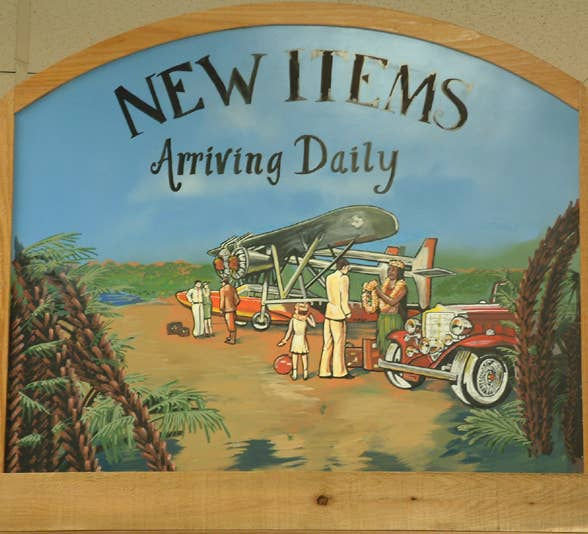
As in, "Trader" Joe travels around the world looking for delicious things...
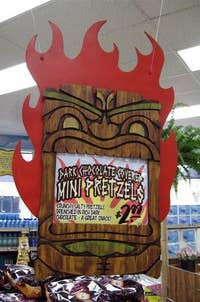
...then sells them to you in a store decked out like an old-school tiki bar.
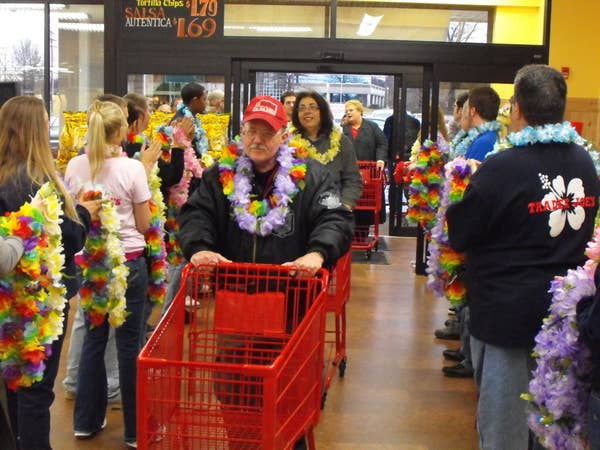
2. Where you'll always receive a royal welcome. Full disclosure: You'll most likely only get lei'd if you're at one of its stores on its opening day.
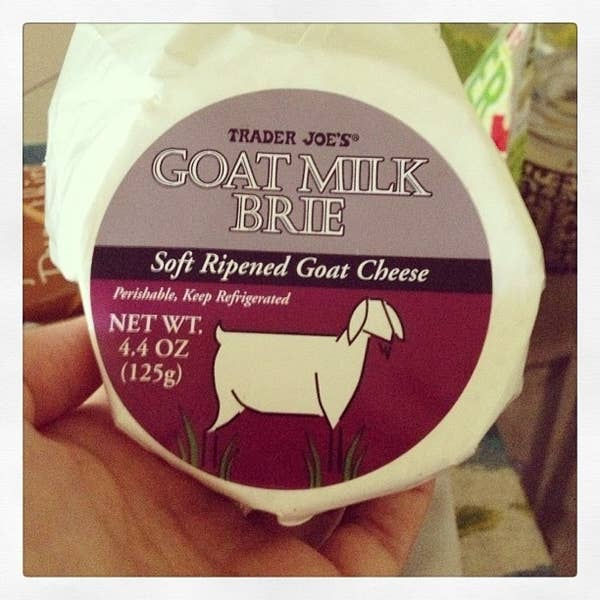
3. It sells lots of random but excellent products that you didn't know existed, but end up buying...
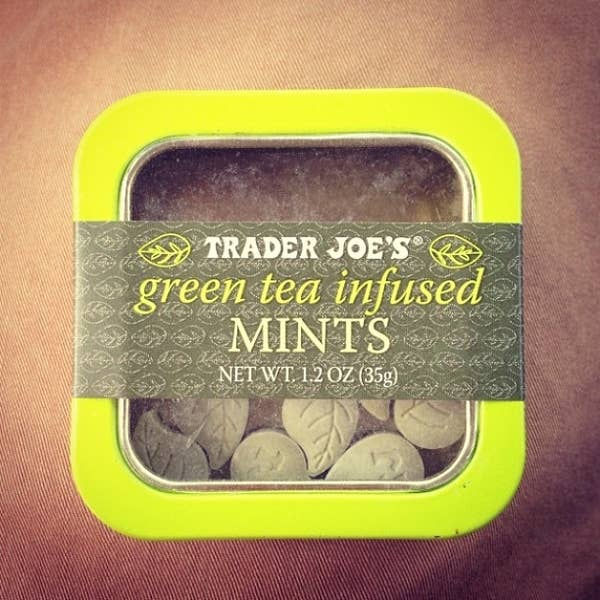
4. ...and then buying again every time you go.

5. You'd be surprised how fast sweet coconut snacks become essential to your very existence.
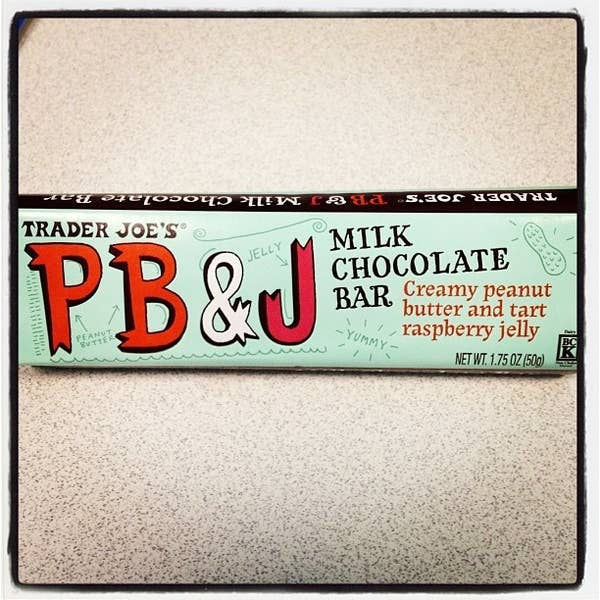
6. TJ's also carries lots of things that seem obvious in retrospect, but that somehow no one else has.
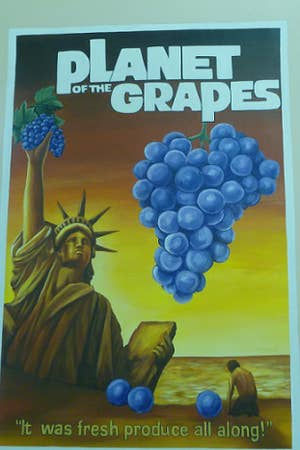
7. Admit it, you find their in-store marketing endearing.

8. Whoever comes up with their product names should seriously consider competing at Punderdome.
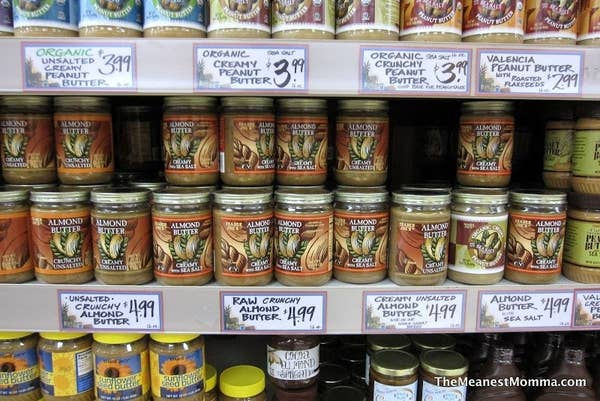
9. You could probably survive on their nut butters alone.
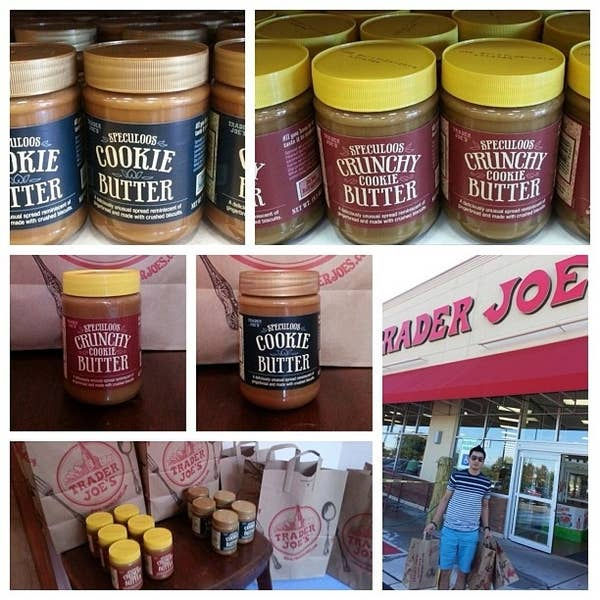
10. AND: COOKIE BUTTER. Butter, made of GROUND COOKIES. There is currently a limit of two per customer. Seriously.
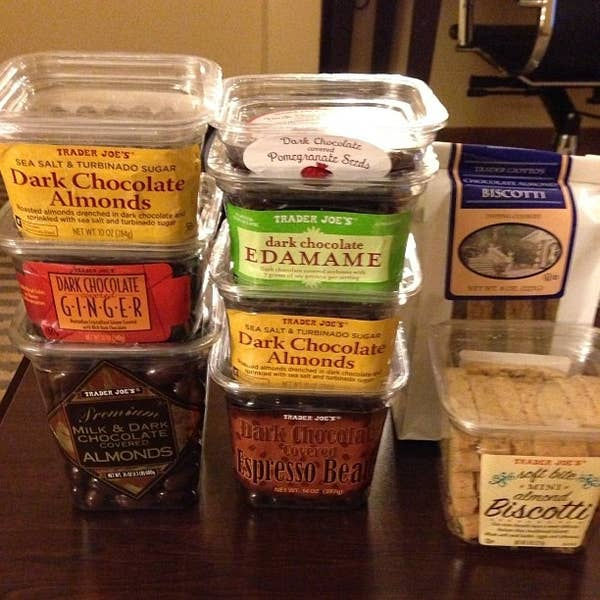
11. They know that good things become great things when they're covered in chocolate.
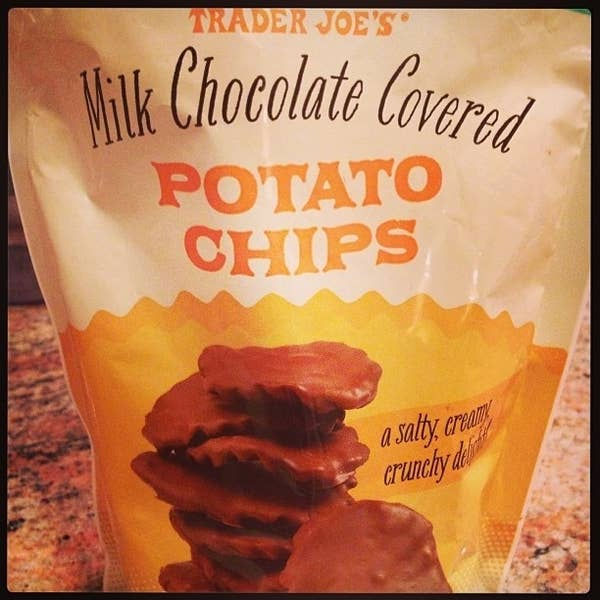
12. Potato chips, for example.
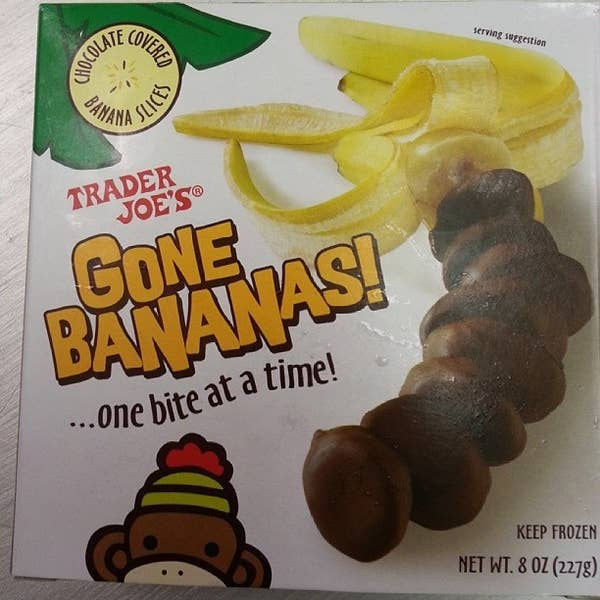
13. And bananas. Chocolate is an equal-opportunity coating at Trader Joe's.
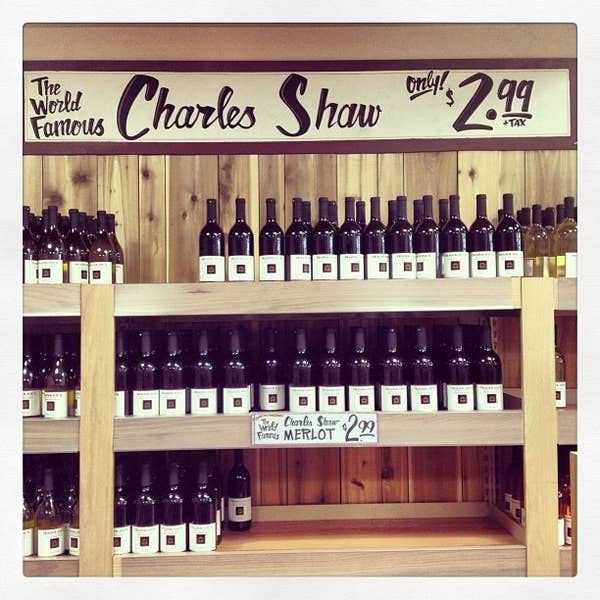
14. Two-Buck Chuck? Game changer.
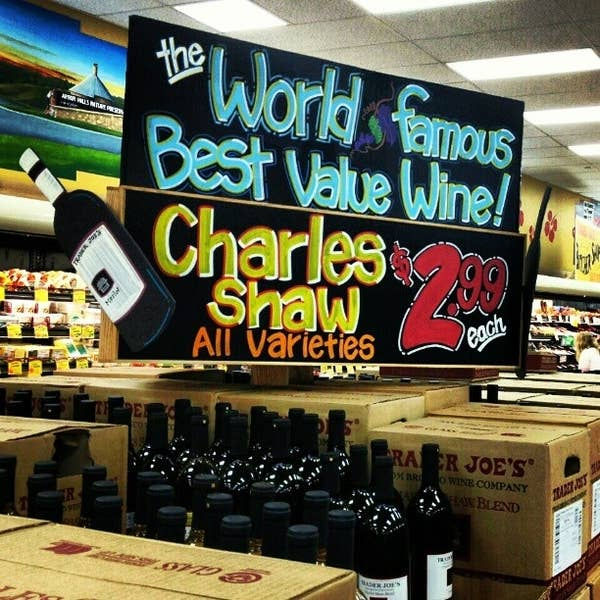
15. OK, so it's technically three bucks, but, still...
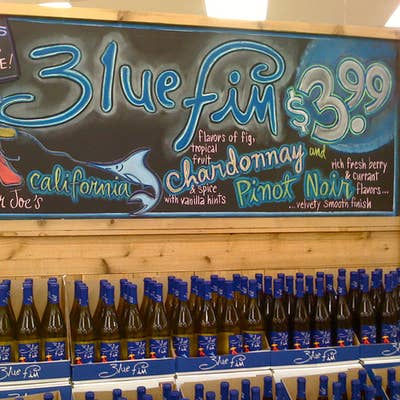
16. Big spenders, feel free to splurge on their higher-end wines.
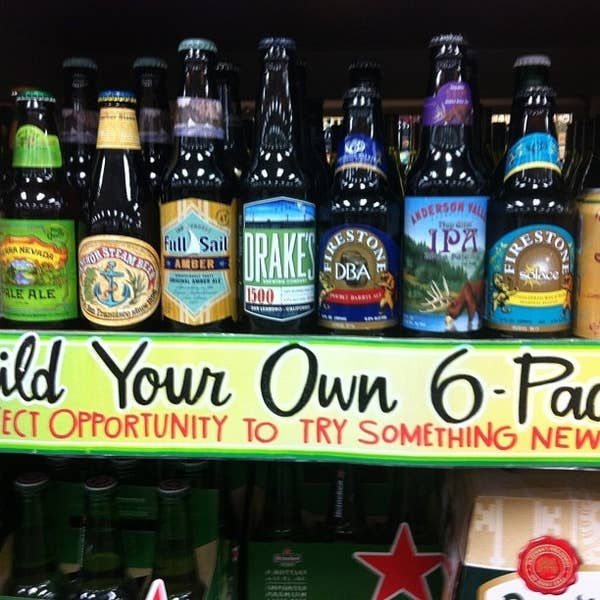
17. Not a wino? That's cool, there's craft beer too.
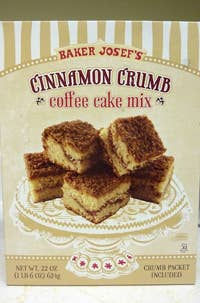
18. Also, Trader Joe has awesome friends — Baker Josef, Trader José, Trader Ming...
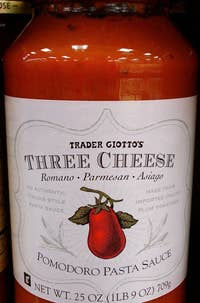
19. Trader Joe-San, Trader Giotto and Trader Jacques.
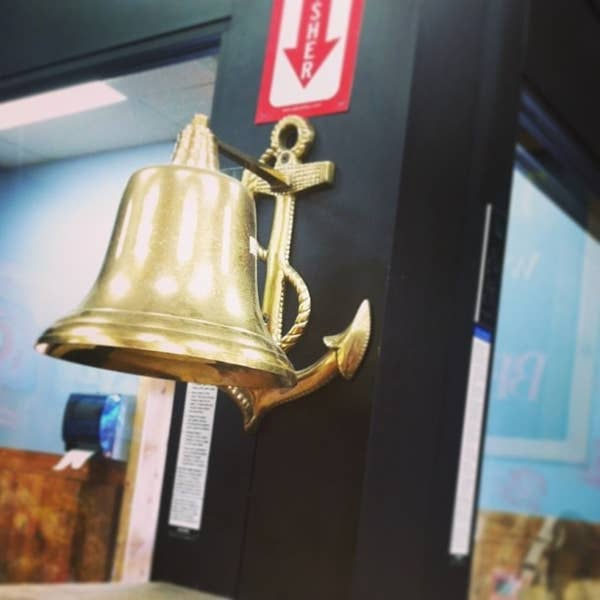
20. It's the little things, like the charming bell they use to make announcements instead of a P.A. system.
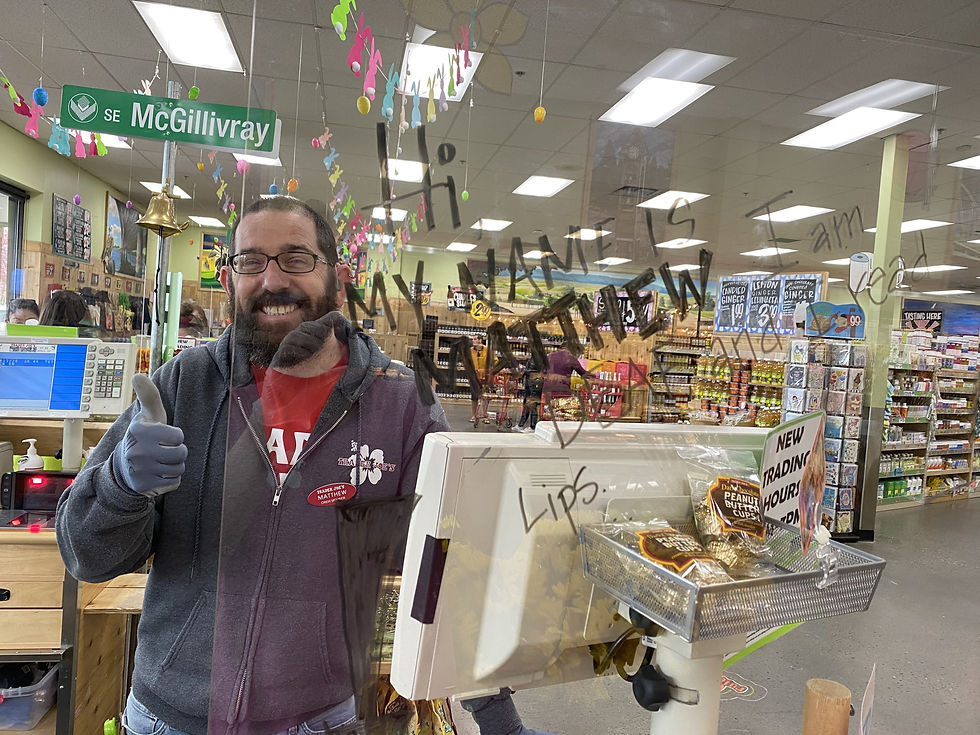
21. And if you're ever overwhelmed by the sheer volume of edible awesomeness, the employees are absurdly helpful.
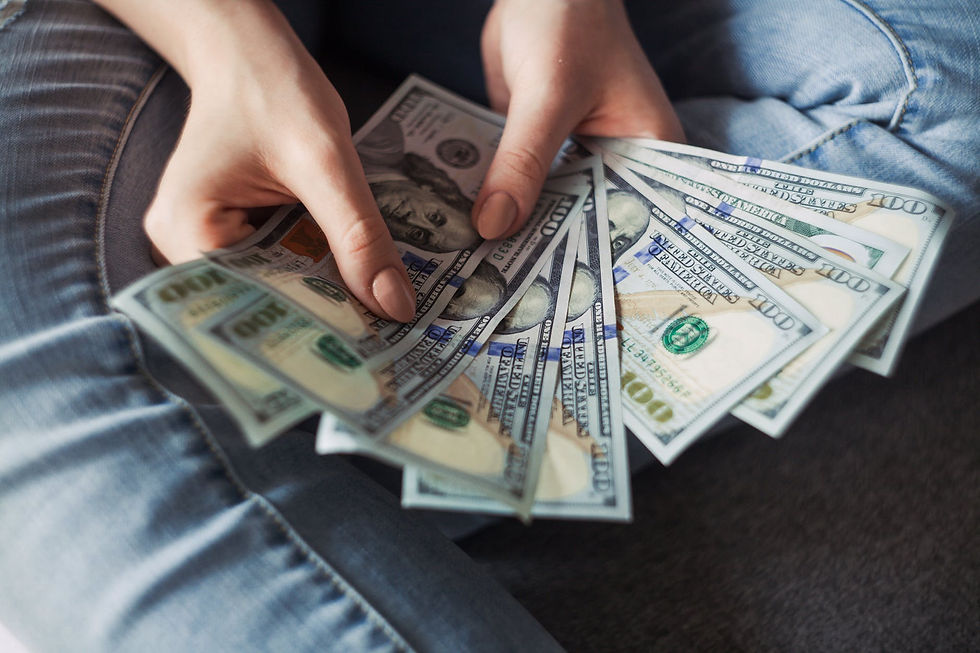
22. Why so nice? Probably because Trader Joe's pays staff members really well. Another plus. According to a 2010 CNN Money article, Trader Joe's full-time crew members — the people that stock the shelves, ring up and bag groceries and help customers in the aisles — can earn starting salaries between $40,000 and $60,000 a year with benefits. Also, Trader Joe's annually contributes 15.4% of employees' gross income to tax-deferred retirement accounts. By industry standards, that is A LOT.

And yeah, the line can be long.

23. But if that one sign-wielding employee can stand in it all day and smile the whole time, so can you.

Comments